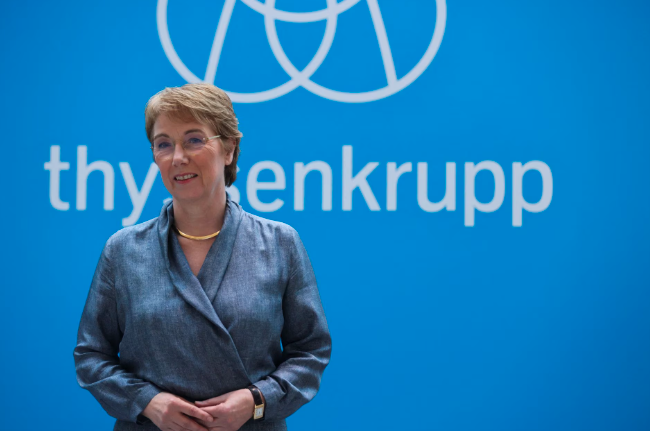Thyssenkrupp said on Monday its chief executive Martina Merz, who launched a major overhaul of the German industrial conglomerate, is leaving, causing shares to plunge.
Merz took over as CEO in 2019 after a string of profit warnings and a failed steel merger that brought Thyssenkrupp to the brink of collapse and triggered the sale of its prized elevator division in a bid to survive.
Thyssenkrupp said the personnel committee of its supervisory board had entered into talks with Merz at her request to terminate her contract by mutual agreement, without giving a reason.
Merz, 60, only last year received a new contract to lead the submarines-to-car parts group until 2028, but lack of progress in plans to hive off the company’s hydrogen and steel division led to growing criticism among investors and workers.
Shares in Thyssenkrupp fell as much as 14.4% on the news, their biggest intraday drop in more than two and half years.
The Alfried Krupp von Bohlen and Halbach foundation, Thyssenkrupp’s top shareholder with a 21% stake, said it regretted the move and remains convinced Merz’s restructuring plan will turn the group into a competitive payer of dividends again.
Thyssenkrupp, meantime, recommended Miguel Angel Lopez Borrego, CEO of automotive and industrial supplier Norma Group and former chairman of wind turbine maker Siemens Gamesa, to succeed Merz from June 1.
“Unfortunately, Mr. Lopez will not have much time to learn the ropes,” said Juergen Kerner, Thyssenkrupp deputy chairman and board member of Germany’s most powerful labour union IG Metall, which last month said Merz’s turnaround plan had failed.
“We are ready to look at future options for any business, but we will measure any concept against the perspective for future viability of the business and job security.”
Merz, in a separate statement, said “promising talks” had been initiated with possible partners for the company’s steel division.
Thyssenkrupp Chairman Siegfried Russwurm said with Borrego at the top, the group would continue the transformation path on the basis of the strategic roadmap that had been laid out.
“This is challenging, but necessary. Because the transformation of Thyssenkrupp is not yet complete,” he said.
Apart from selling elevators, Merz, whose tenure saw Thyssenkrupp’s share price nearly halve, also divested or shut smaller businesses, responding to criticism that the company is too complex.
She had planned to create a group of companies similar to a holding structure in which the parent owns stakes but does not necessarily control individual businesses.
Source : Reuters





